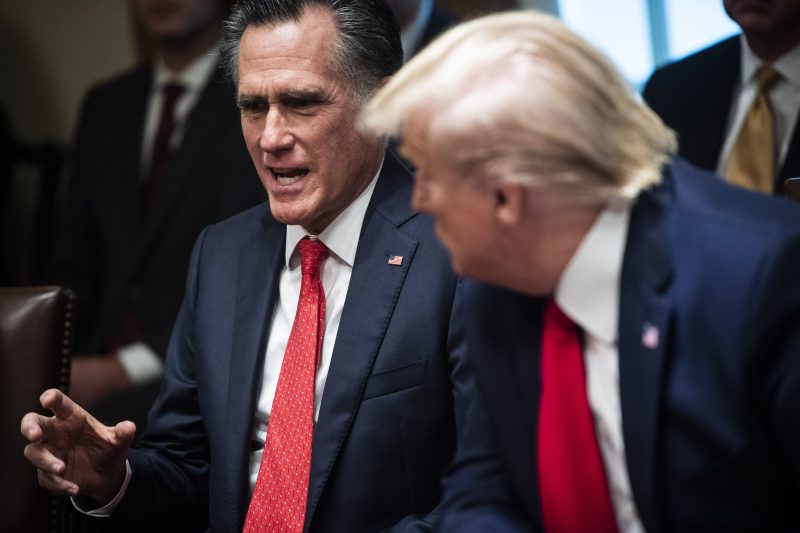Sen. Mitt Romney of Utah announced Wednesday that his political career will come to an end after the 2024 election. Romney, a former governor and the 2012 GOP presidential nominee, declined to seek a second term in the Senate.
The move is a familiar one — a prominent Republican gathering the courage to arrest his party’s drift toward Trumpism and then, when the next election comes around, heading for the exits.
But rarely has such an exit been so consequential for that segment of the party. And rarely has it come with the degree of resignation Romney expressed.
Unlike other Trump critics who have opted to retire, Romney appeared to have had more than a fighting chance, had he opted to run again. Utah is an unusual state, deeply conservative but also with a large vein of Trump skepticism coursing through that conservatism. And Romney’s personal brand there — dating to his stewardship of the 2002 Salt Lake City Olympics — clearly gave him latitude that other Republicans have not enjoyed.
This situation is unlike that in neighboring Wyoming, where Rep. Liz Cheney’s impeachment-related efforts rendered her persona non grata in the party and sent her to a 37-point defeat in the 2022 GOP primary. Nor was it like what happened in neighboring Arizona, where Sen. Jeff Flake opted to retire ahead of the 2018 election rather than seek the approval of one of the most extreme and Trump-aligned state Republican parties in the country.
But Romney’s exit does echo Flake’s in another way: He is basically admitting that the party has made its choice and that there is little place for his brand of politics.
In an interview with longtime Washington Post politics correspondent Dan Balz, Romney played down the idea that he would get involved in supporting a 2024 candidate who is running against Trump. The reason: It would be counterproductive.
“I doubt my support will mean anything positive to any of the candidates at the finish line,” Romney said. “I’m not looking to get involved in that.”
And then, the most striking quote: “It’s pretty clear that the party is inclined to a populist demagogue message.”
This is a man who just a decade ago was his party’s choice for president saying his party has made its choice — and that the choice is demagoguery.
Romney built on this point in an excerpt — published Wednesday shortly after his retirement announcement — from Atlantic writer McKay Coppins’s forthcoming book about him.
Coppins writes that Romney has wrestled with the idea that Republicans had allowed a sleeping giant of authoritarianism — one Romney conceded might always have been there — to fester within their party.
“A very large portion of my party,” he told Coppins a few months after Jan. 6, “really doesn’t believe in the Constitution.”
The sentiments carry echoes of what Flake, a fellow Mormon Republican, said in 2017 when he announced his own retirement.
Flake acknowledged that it was virtually impossible for him to win a primary unless he completely overhauled his brand and said things he didn’t believe. He said this despite previously being known as a conservative’s conservative, dating to his days in the House.
“Here’s the bottom line: The path that I would have to travel to get the Republican nomination is a path I’m not willing to take and that I can’t in good conscience take,” Flake said then. “It would require me to believe in positions I don’t hold on such issues as trade and immigration, and it would require me to condone behavior that I cannot condone.”
Flake added in remarks on the Senate floor: “It is clear at this moment that a traditional conservative who believes in limited government and free markets, who is devoted to free trade, who is pro-immigration, has a narrower and narrower path to nomination in the Republican Party.”
Flake would later reflect — in an op-ed published, of all days, on Jan. 6, 2021, hours before Capitol riot — that “the rise of a dangerous demagogue, and my party’s embrace of him,” ended his career.
Romney’s announcement wasn’t all doom and gloom. He expressed hope that his vision for the party might ultimately win the day.
“If it can change in the direction of a populist,” Romney told Balz of his party, “it can change back in the direction of my wing of the Republican Party.”
He added, “I think we have the leverage of being right, and in the final analysis, right will prevail.”
The problem is that those willing to try to push the party in that “right” direction keep leaving, often voluntarily or with a not-so-friendly nudge from GOP primary voters.
In addition to Flake’s retirement, Sen. Bob Corker (R-Tenn.) also retired in 2018. Sen. John McCain (R-Ariz.) died that year, shortly after he became the GOP’s preeminent Trump critic. Impeachment-backing senators Richard Burr of North Carolina, Patrick J. Toomey of Pennsylvania and Ben Sasse of Nebraska — three of the seven GOP votes to convict Trump after Jan. 6 — all retired or resigned within two years of that vote. Rep. Adam Kinzinger (R-Ill.), Cheney’s colleague on the House Jan. 6 committee, retired. The only Republican impeachment backers who survived the 2022 election were the ones running under unusual systems that appeared to benefit middle-of-the-road candidates.
What’s left is a party devoid of prominent politicians truly making the case for a different course. And Romney’s exit, by virtue of his stature and his potential to hang around, is perhaps the most painful blow to that effort yet.

